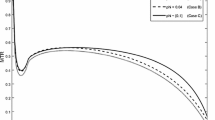Abstract
Bénabou and Ok use expected utility to argue the prospect of upward mobility (POUM) may cause majority rejection of redistributive taxes that benefit the majority. They believe the poor are not risk seeking but instead believe they may soon be rich. In paid computerized experiments that allows redistribution the poor are risk seeking and the rich risk averse even though subjects play both roles. Changing risk attitudes with wealth levels is predicted by Kahnemann and Tversky (Econometrica 47(2):263–291, 1979). Rounds that mimic actual middle class decisions produce desired tax rates over 50% suggesting POUM is only a partial explanation for low taxes.
Similar content being viewed by others
References
Box G, Hunter G, Hunter J (1978) Statistics for experimenters. Wiley, New York
Bénabou R, Ok E (2001) Social mobility and the demand for redistribution. QJE 116:447–487
Easterlin R (2002) Happiness in economics. Edward Elgar Publishers, Northampton, MA
Friedman M, Savage L (1948) The utility analysis of choices involving risk. J Polit Econ 56:279–304
Graham C, Pettinato S (2002) Happiness and hardship: opportunity and insecurity in new Market economies. The Brookings Institution Press, Washington, DC
Holt C, Laury S (2002) Risk aversion and incentive effects. AER 92:1644–1655
Hsiao C (2003) Analysis of panel data. Cambridge University Press, Cambridge
Kahneman D, Tversky A (1979) Prospect Theory: an analysis of decision under Risk. Econometrica 47(2): 263–291
Kahneman D, Tversky A (2000) Choices, values and frames. Cambridge University Press, Cambridge
List J (2004) Neoclassical theory versus prospect theory: evidence from the marketplace. Econometrica 72:615–625
Putterman L (1997). Why have the rabble not redistributed the wealth? On the stability of democracy and unequal property. In: Roemer JE (eds). Property relations, incentives and welfare. Macmillan, London
Rabin M “Risk Aversion and Expected Utility Theory: a calibration theorem. Econometrica 68:1281–1292
World Bank (1999) Entering the 21st century: World development report 1999/2000. Oxford University Press, Oxford
Author information
Authors and Affiliations
Corresponding author
Additional information
Professor Zheng made the original suggestion to do experiments on the POUM hypothesis. W. James Smith suggested using parameters from real societies.
Rights and permissions
About this article
Cite this article
Beckman, S.R. A Tax and Redistribution Experiment with Subjects that Switch from Risk Aversion to Risk Preference. Soc Choice Welfare 27, 627–641 (2006). https://doi.org/10.1007/s00355-006-0148-5
Received:
Accepted:
Published:
Issue Date:
DOI: https://doi.org/10.1007/s00355-006-0148-5



